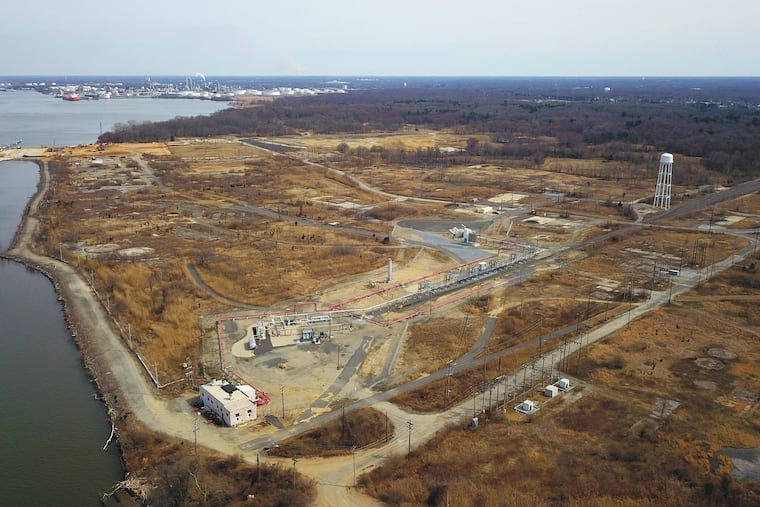Natural gas should be a part of Pennsylvania’s energy future | Opinion
Should plans for a liquefied natural gas (LNG) export facility move forward in Gibbstown, the U.S. will open new markets for Pennsylvania-provided energy.

With a change of leadership in Washington and related priorities being set, how we produce, transport and power modern life remains a key priority for policymakers.
Some seek policies that select pre-determined energy winners and losers, regardless of what the market and consumers want and are demanding. Policies are about choices. While these choices are not always crystal clear, the push to cut use of natural gas, as expressed in recent Inquirer editorials and op-eds, have presented extreme views toward energy and natural gas development that advance false choices between economic growth, affordable energy, and climate progress.
» READ MORE: Fracking puts Pa. at an energy crossroads. It’s time to pick a direction. | Editorial
The path of eliminating natural gas production and use would deliver a crushing economic blow, higher consumer energy costs, an unreliable electric grid, and harm to families and small businesses confronting the pandemic’s impacts. This path of energy and environmental policy extremism is neither fair nor just — and there are more pragmatic and commonsense solutions to our greatest energy and climate challenges.
Pennsylvania natural gas is the solution to delivering the reliable, affordable energy that makes modern life possible and moves our economy forward while achieving the environmental and climate progress we all agree is needed.
This is the way for the U.S. to “build back better,” as President Biden says: create opportunities for good-paying union jobs, give U.S. manufacturers a competitive advantage to re-shore jobs, continue to lead the world in carbon emission reductions, and help nations from Europe to Asia achieve cleaner skies and the related health benefits.
We can advance these shared goals by embracing market-driven energy policies that encourage innovative approaches to produce, transport, and use energy in cleaner, more efficient ways.
Consider our environmental and climate progress over the past 15 years. As the U.S. became the world’s top natural gas producer over the past decade, total U.S. greenhouse gas emissions through 2019 have seen double-digit declines, according to new federal data. As natural gas accounts for a larger electricity generation share, Pennsylvania power generation-tied emissions have also plummeted to decades-low levels, per analysis from the Marcellus Shale Coalition (MSC), the natural gas industry trade group that I lead—resulting in community-level public health benefits.
With natural gas serving as the power grid’s primary fuel source — 40% of the nation’s current baseload — Pennsylvanians are realizing more than $2,000 annually in average home energy savings, according to MSC analysis of state data.
In fact, today’s highly efficient natural gas plants work in tandem with intermittent wind and solar sources to provide necessary power. This partnership enables renewable energy growth, as the federal government projects wind and solar generation — supported by natural gas — will account for the largest share of new generation capacity in 2021.
It’s through a diverse, cleaner energy mix of natural gas and renewables that the U.S. leads on climate. And American natural gas exports can help spread this progress globally.
» READ MORE: Biden’s executive order on oil and gas drilling does little to protect health in Pa. | Opinion
Should plans for a liquefied natural gas (LNG) export facility move forward in Gibbstown, the U.S. will open new markets in Europe, Africa, and Asia for Pennsylvania-provided energy. Globally, the federal government projects the U.S.’s LNG exports to double by 2050, with China and India driving growth to meet their economic and climate targets.
This path of pragmatic energy and environment policy isn’t just about climate — it’s about national security and economics too. Expanding access to American-produced energy is a crucial diplomatic tool that improves our security and America’s standing in the world.
As Jim Snell of the Philadelphia-based Steamfitters Local 420 has said, the proposed area LNG facility is “great news for our regional economy” and will “create several hundred good-paying union jobs.” That’s in addition to the hundreds of proud multi-generation union women and men who’ve — thanks to natural gas delivered via pipeline — transformed Marcus Hook into a modern energy processing, storage, and transportation hub.
Rather than picking winners and losers among energy sources, stacking on higher energy taxes for consumers via Governor Wolf’s latest severance tax plan, or suggest that our hardworking union workforce should not be permitted to safely build critical infrastructure, let’s come together and focus on the solutions that will make positive change happen.
David Callahan is president of the Pittsburgh-based Marcellus Shale Coalition. marcelluscoalition.org